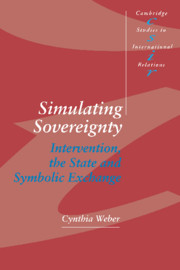Book contents
- Frontmatter
- Contents
- Preface
- Acknowledgments
- 1 Writing the state
- 2 Examining the sovereignty/intervention boundary
- 3 Interpretive approaches
- 4 Concert of Europe interventions in Spain and Naples
- 5 Wilson Administration actions in the Mexican and Bolshevik revolutions
- 6 United States invasions of Grenada and Panama
- 7 Symbolic exchange and the state
- Notes
- References
- Index
- Titles in the series
3 - Interpretive approaches
Published online by Cambridge University Press: 30 September 2009
- Frontmatter
- Contents
- Preface
- Acknowledgments
- 1 Writing the state
- 2 Examining the sovereignty/intervention boundary
- 3 Interpretive approaches
- 4 Concert of Europe interventions in Spain and Naples
- 5 Wilson Administration actions in the Mexican and Bolshevik revolutions
- 6 United States invasions of Grenada and Panama
- 7 Symbolic exchange and the state
- Notes
- References
- Index
- Titles in the series
Summary
I propose to trace historically the constitution and interpretation of community standards for legitimate intervention practices and their corresponding effects upon collective understandings of state sovereignty. Sovereignty can take various forms, depending upon how it is represented or simulated and what its foundations or models are. Three central questions inform my analysis.
I begin by asking, “What is represented?” More specifically I ask: what, if any, are the reigning community-ecognized standards of interpretation in terms of sovereignty and intervention justifications for the Concert of Europe, the Wilson administration, and the Reagan–Bush Administrations?; who or what is the foundational authority figure for each interpretive community?; where if anywhere does sovereignty reside in each distinct historical period and for each particular intersubjective community?; what if anything does sovereignty mean for each community?; and what does and does not count as an intervention for each community?
Representation is often taken for granted. It is the last question we consider when we think, yet the first question we ask (at least subconsciously) when we read. To lend continuity to my presentation of intervention debates in Concert of Europe, Wilson administration, and Reagan–Bush Administrations discourses, I ask “what is represented?” first to facilitate reading. I return to it again in the conclusion to facilitate a rethinking of representational logics.
My second question is, “how are sovereign foundations represented?” By way of what strategies are power and knowledge organized so that sovereign foundations are discursively constructed? How in particular do intervention justifications participate in the construction of sovereign foundations, be they domestic (citizenries) or international (interpretive communities)? Poststructuralist techniques informed by the works of Michel Foucault are employed to investigate these questions.
- Type
- Chapter
- Information
- Simulating SovereigntyIntervention, the State and Symbolic Exchange, pp. 30 - 39Publisher: Cambridge University PressPrint publication year: 1994

